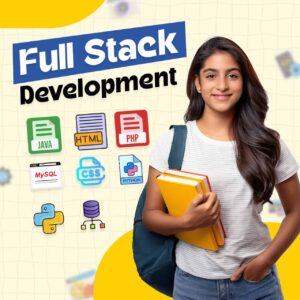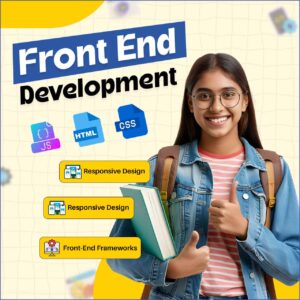Description
Did you know that the employment of software developers, including backend developers, is expected to expand by 22% between 2020 and 2030, which is significantly faster than the average for other occupations, as per the U.S. Bureau of Labor Statistics (BLS) which means that in the upcoming years, this equates to more than 400,000 new jobs?
Whether you’re new to development or looking to expand your skills, this course will teach you how to create, manage, and optimize databases, secure your applications, and integrate APIs for seamless data handling. This course is perfect for anyone looking to specialize in the technical side also called the backend of web development and confidently build scalable applications.
Who Is This Course For?
- College students and tech enthusiasts wanting to understand web development.
- Aspiring developers who want to specialize in back-end systems.
- Front-end developers looking to expand their knowledge.
- Freelancers and professionals aiming to enhance their full-stack development skills.
Explore Related Topics
- Database Management Systems (DBMS)
- Cloud Computing and Deployment
- Unit Testing and Test-Driven Development (TDD)
- Version Control with Git and Collaboration Tools.
Benefits of this course
- Learn server-side programming to build secure and scalable applications.
- Gain expertise in databases like MongoDB and MySQL.
- Master APIs and frameworks to create seamless systems.
- Prepare for high-paying roles like Backend Developer or Software Engineer.
- Build a portfolio of real-world backend projects.
- Understand how to design and optimize server architecture.
- Stay competitive with expertise in backend tools and frameworks.
- Access job opportunities in industries like e-commerce and fintech.
- Contribute to creating efficient and high-performance applications.
- Gain skills to be a vital part of any development team.
Lesson Plan
Here’s an enriched and more detailed version of the Back End Development course curriculum, organized into logical modules and deeper subtopics:
Module 1: What is Back-End Development?
- Overview of Front-End vs. Back-End
- The Role of a Back-End Developer
- Common Back-End Architectures (Monolithic vs. Microservices)
Module 2: Understanding the Web: HTTP/HTTPS, Requests & Responses
- Basics of HTTP/HTTPS protocols
- Request Methods (GET, POST, PUT, DELETE, PATCH)
- Understanding Status Codes
Module 3: Setting Up Development Environments
- Introduction to Version Control (Git, GitHub, GitLab)
- Local Development Environment Setup (Node.js, Python, Ruby)
- Integrated Development Environments (IDEs) and Code Editors (VS Code, PyCharm, etc.)
- Using Package Managers (npm, pip, bundler)
Module 4: Server-Side Programming Basics
- Overview of Server-Side Languages (JavaScript/Node.js, Python, Ruby)
- Building a Basic Server with Node.js (Express.js Introduction)
- Introduction to Python Frameworks (Flask/Django)
- Ruby on Rails Basics
Module 5: Understanding Databases
- Relational Databases (MySQL, PostgreSQL)
- Basics of SQL
- Designing Relational Schemas
- Writing Complex Queries, Joins, and Indexing
Module 6:NoSQL Databases (MongoDB)
- Document-based Databases Overview
- Designing Schemas in MongoDB
- CRUD Operations and Aggregation Frameworks
- Choosing the Right Database for Your Application
- ORMs (Object-Relational Mappers): Sequelize, SQLAlchemy, ActiveRecord
Module 7: APIs and Web Services Integration
- Understanding RESTful APIs and Best Practices
- Designing RESTful Endpoints
- Introduction to GraphQL
- API Authentication (JWT, OAuth)
- Consuming Third-Party APIs (REST and GraphQL)
- Building Real-Time Applications with WebSockets
Module 8 :Building and Deploying Scalable Applications
- Application Structure and Best Practices
- Introduction to Cloud Providers (AWS, Azure, GCP)
- Containerization with Docker
- CI/CD Pipelines (GitHub Actions, Jenkins)
- Deploying to Platforms (Heroku, AWS EC2, AWS Lambda)
- Serverless Architecture Introduction
Module 9:. Authentication and Authorization
- Implementing User Authentication (Sessions, Cookies, Tokens)
- OAuth 2.0 and OpenID Connect
- Role-Based Access Control (RBAC)
- Managing API Keys and Secrets
Module 10:. Error Handling and Debugging
- Understanding Error Types (Syntax, Runtime, Logic)
- Structured Error Logging and Monitoring (Winston, Sentry)
- Debugging Techniques and Tools (Debugger, Chrome DevTools)
Module 11:. Testing and Quality Assurance
- Introduction to Unit Testing (Mocha, Chai, Pytest)
- Integration Testing and End-to-End Testing (Jest, Cypress)
- API Testing with Postman and Automated Tests
Module 12:. Performance Optimization
- Caching Strategies (Redis, Memcached)
- Database Optimization (Indexing, Query Optimization)
- Load Balancing and Horizontal Scaling
- Optimizing API Performance (Rate Limiting, Pagination)
- Monitoring Performance (New Relic, Datadog)
Module 13:. Security Best Practices
- OWASP Top 10 for Web Applications
- Protecting Against SQL Injection, XSS, CSRF
- Secure Data Transmission (TLS, HTTPS)
- Secure Coding Practices and Code Reviews
- Managing User Data and GDPR Compliance
Module 14:. Advanced Concepts
- Event-Driven Architecture (Message Queues, Kafka, RabbitMQ)
- Microservices Architecture in Depth
- Introduction to Graph Databases (Neo4j)
- Advanced Deployment Strategies (Blue/Green Deployment, Canary Releases)
Module 15:. Full-Stack Development Overview
- Integrating Front-End and Back-End (React/Vue with Node.js/Python)
- Building a Simple Full-Stack Application
- State Management in Full-Stack Applications
Module 16:. Capstone Project
- Define a Real-World Problem Statement
- Requirements Gathering and Planning
- Designing API Endpoints and Database Schemas
- Building and Testing the Application
- Deploying to a Cloud Provider
- Documentation and Final Presentation
FAQ
-
What is back-end development?
Back-end development focuses on the server-side of websites, managing databases, and server logic.
-
Do I need to know front-end development to take this course?
No, but a basic understanding of web development concepts will be helpful.
-
What programming languages will I learn in this course?
The course covers Python, Node.js, and Ruby, along with database management.
-
Will I get a certificate upon completion?
Yes, upon completing all course modules, you will receive a certificate.
-
Can I take this course if I’m a beginner?
Absolutely! This course is designed for beginners to learn at their own pace.







Reviews
There are no reviews yet.